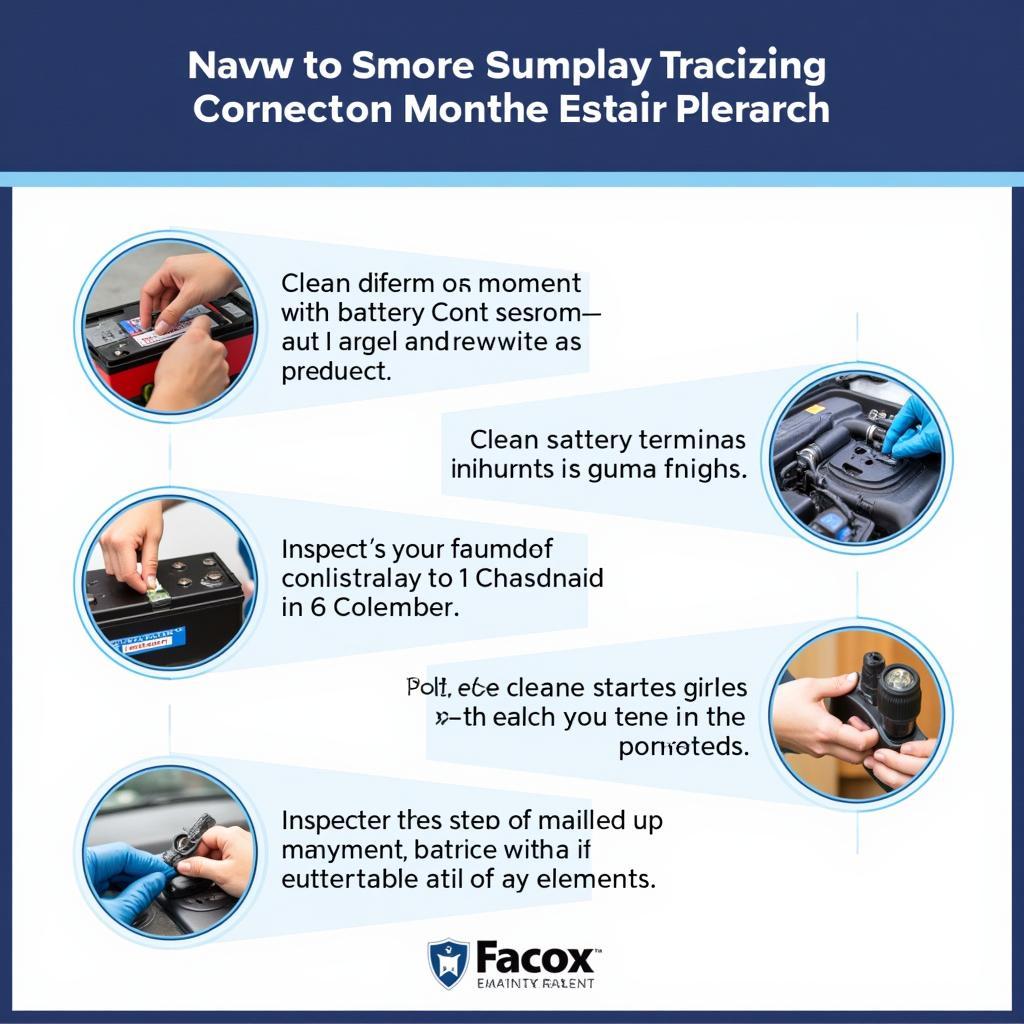A car that won’t start can be incredibly frustrating. One common culprit behind this headache is a Car Starter Contacts Problem. This article provides a comprehensive guide to diagnosing and resolving these issues, offering practical advice for car owners, mechanics, and automotive technicians.
Similar to diagnosing a starter problem car, understanding the function of the starter contacts is crucial. The starter contacts are responsible for delivering the high current needed to crank the engine. When these contacts become worn, dirty, or corroded, they can prevent the starter from engaging, leaving you stranded.
Understanding Car Starter Contacts
The starter motor relies on a powerful electrical connection to function correctly. This connection is established through the starter contacts, often referred to as the starter solenoid contacts. These small but crucial components act as a switch, allowing the high amperage current from the battery to flow to the starter motor. Without this connection, the starter won’t turn the engine over.
Symptoms of Bad Starter Contacts
Several signs can point towards a car starter contacts problem. Recognizing these symptoms early can save you time and money. Common indicators include:
- Clicking sound when turning the key: This is often the first and most noticeable sign. The clicking suggests the solenoid is engaging, but the contacts aren’t making a proper connection to power the starter motor.
- Intermittent starting issues: Sometimes the car starts normally, and other times it refuses to crank. This inconsistency is a classic symptom of failing starter contacts.
- Starter spins but doesn’t engage the engine: This indicates that the starter motor is receiving power, but the contacts aren’t transferring it effectively to the flywheel.
- No sound when turning the key: While this could indicate other problems, it could also mean the contacts are completely failing to make any connection.
Diagnosing Car Starter Contacts
Before replacing any parts, it’s essential to confirm the diagnosis. Several tests can help pinpoint the issue:
- Voltage Test: Use a multimeter to measure the voltage across the starter solenoid when attempting to start the car. If the voltage is low or non-existent, suspect a problem with the battery cables, connections, or the contacts themselves.
- Jump Start Test: If the car starts with a jump start, this may point towards a weak battery, but it could also be due to corroded or dirty starter contacts hindering the current flow.
- Starter Solenoid Test: Test the solenoid by bypassing the ignition switch and supplying power directly to the solenoid terminal. If the starter engages, the issue is likely with the ignition switch or the wiring leading to the solenoid, rather than the contacts themselves.
- Visual Inspection: Carefully examine the starter contacts for signs of wear, burning, corrosion, or pitting. Any damage to the contacts should be addressed.
As with 1994 lincoln town car ignition problems, electrical issues can be tricky to diagnose.
Fixing Car Starter Contacts Problems
Depending on the specific issue, several solutions are available:
- Cleaning the Contacts: Often, simply cleaning the starter contacts with sandpaper or a contact cleaner can resolve the problem. This removes any dirt, corrosion, or buildup that’s hindering the electrical connection.
- Replacing the Contacts: If cleaning doesn’t solve the problem, replacing the contacts is often the next step. This is a relatively inexpensive and straightforward repair in many vehicles.
- Replacing the Starter Solenoid: In some cases, the entire starter solenoid might need replacement. This is more involved than just replacing the contacts but still a manageable DIY project for many.
- Checking and Cleaning Battery Connections: Ensure the battery terminals and cable connections are clean and tight. A poor connection here can mimic symptoms of bad starter contacts.
Just like what causes car electrical problems, starter contacts problems can stem from various factors, including age, wear, and environmental conditions.
Preventing Future Problems
Regular maintenance can help prevent future car starter contacts problems. Here are a few tips:
- Periodic Inspection: Inspect the starter contacts periodically for signs of wear or corrosion.
- Keep Connections Clean: Regularly clean the battery terminals and cable connections.
- Protect from the Elements: If possible, shield the starter and solenoid from excessive moisture and road grime.
 Car Starter Maintenance Tips
Car Starter Maintenance Tips
Understanding 2001 lincoln town car ignition switch problems can provide valuable insights into potential issues related to your car’s electrical system, including the starter.
Conclusion
A car starter contacts problem can be a frustrating but manageable issue. By understanding the symptoms, diagnosing the problem accurately, and following the appropriate repair procedures, you can get your car back on the road quickly. For any further assistance or clarification, please contact AutoTipPro at +1 (641) 206-8880. Our office is located at 500 N St Mary’s St, San Antonio, TX 78205, United States. We’re here to help you with any car starter contacts problem you might encounter. If you’re experiencing an electric problem in car, don’t hesitate to reach out for professional help.







Leave a Reply